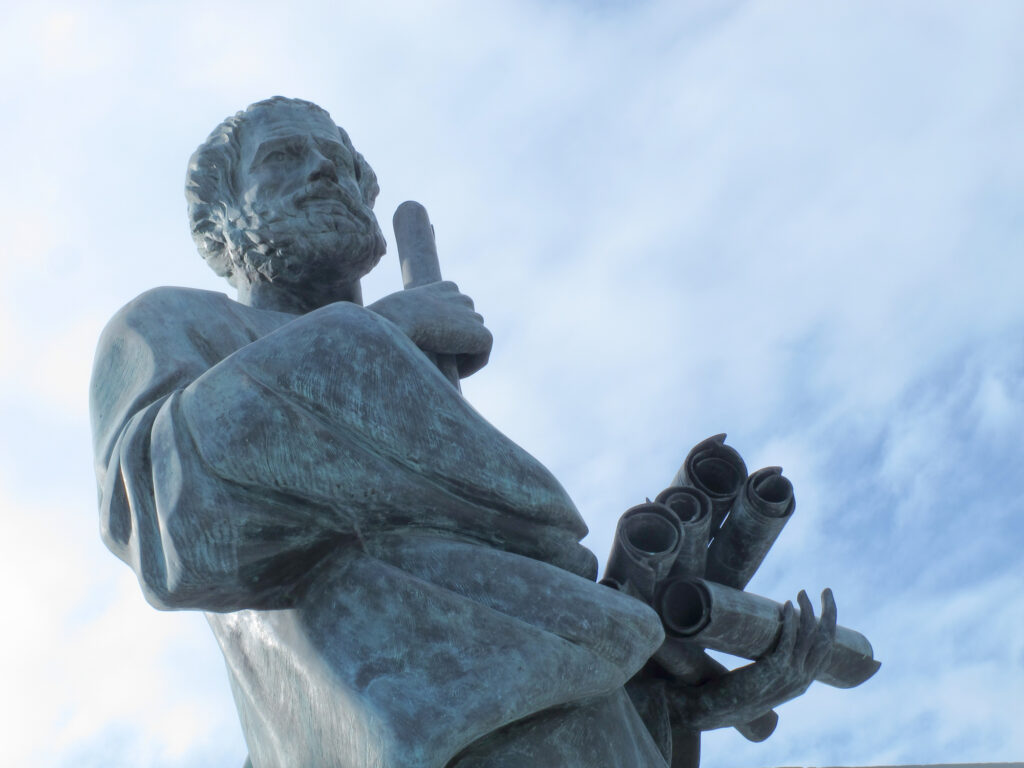The great Greek philosopher Aristotle (384-322 B.C) was one of the brightest minds of all time. His work has influenced dramatically our world in various aspects.
Aristotle was born in Stagira in 384 B.C, a small village located in Macedonia, northern Greece. He came from a wealthy family and his ancestors had come a long way in Medicine. His father serviced as the personal doctor of the Macedonian king Amyntas and Aristotle had received rich and profound education until he became 17 years old. Some of the basic elements of his education that influenced his spirit, included principles of civil liberties such as individual freedom, egalitarianism (the fact that everyone is equal against the laws) and citizen’s participation in the public affairs. Every free man should be engaged in politics or public affairs related to his community.
Aristotle visited Athens for his first time at his 17 and he settled down so as to become a student at Plato’s Academy. Plato, a preeminent Greek philosopher had already founded his academy which was considered to be one of the first universities in ancient Greece. At Plato’s Academy, Aristotle studied philosophy, mathematics and astronomy. He remained at the Academy for 20 years. Aristotle moved on by establishing the Lyceum, a school of his own which was run more systematically by Theofrastos, a follower of his. Aristotle had the honor to be summoned by the King Philip II of Macedonia in order to become the teacher of Alexander the Great. For this purpose, he set up a school in Mieza, a town located in Macedonia, northern Greece. Alexander the Great and other children that became Alexander’s officials and best friends were taught and raised in the best possible way.
Aristotle was greatly influenced by Plato’s methodology in approaching philosophical issues. However, he broadened his scope of research as he differentiated himself from his teacher Plato. Plato believed that the empirical knowledge was not of great significance in understanding deeper philosophical meanings. On the other hand, Aristotle claimed that the observation and systematic research of the natural world (animals, plants, organic and non organic material) could help the philosopher give answers to the most important question of philosophy concerning the beginning of life. For Aristotle, this was the primary mission of philosophy, to find the cause of everything.
This is how he reached the conclusion that a superior form of existence can affect other forms of life without being dependent on anything else. He named it God. In Greek, he used the term “το πρώτο κινούν ακίνητο” which stands for “the first thing that gives motion to others without moving itself”. However, Aristotle did not believe that this superior form of existence interferes in our lives.
Moreover, he claimed that all beings were to reach a final goal which was identified with their final form of existence. This form was called “telos” which in ancient Greek means goal or aim. The process of this journey – a being’s achievement to fulfill the final form of its existence – was called “entelecheia-εντελέχεια”. The Greek philosopher also claimed that all human beings consist of a substance that does not end after their biological death. He used to name it, “νους-nous” referring to the spiritual term of mind. Undoubtedly, he was influenced by Plato’s concept about soul’s immortality despite the fact that he didn’t express it in the same way neither believed in it.
Aristotle’s writings reflect the scientific knowledge of his era in every field of human scientific engagement. He wrote about the history of philosophy and established general principles in sciences such as physics, chemistry and meteorology. He was also engaged in rhetoric and literature analysis of his time. Additionally, he was the first man in history, to introduce the science of biology establishing a valid methodology of research about various biological species. He also studied several political regimes leaving behind a priceless analysis about politics that can always come in handy for scholars of political sciences.
If we were asked about Aristotle’s diachronic legacy and contribution to the human kind, we would certainly mention that he was the first man to present what we call today “a scientific piece of writing” by citing all previous researchers’ work in every field of research he wrote about. He introduced the term “sylogismos-συλλογισμός” which is related to the deductive reasoning. It allows you to take information from two or more statements and draw a logically sound conclusion. If A equals B and B equals C, then A equals to C. He also introduced the term “epagogi – επαγωγή” known as inductive reasoning. With the inductive reasoning the premises provide some evidence for the validity of the conclusion. His scientific methodology set the foundations of the scientific research of the western world. He influenced greatly the Romans, the scientific thought developed in the Byzantine era as well as of the Renaissance in Europe. His thoughts did not only influenced kings, researchers and politicians, but also theologians and resulted in scholasticism, the movement that uses logical statements to approach theological meanings.
Aristotle’s legacy will remain eternal along with his writings. We shall all study his writings and draw useful conclusions for our life and the world we live in.
